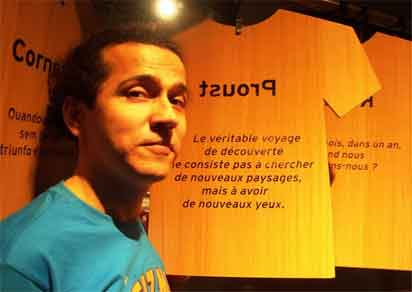| Truth-Functionality
Member of: LoLITA and DIMAp, UFRN, Brazil Collaborator of: SQIG, IT, Portugal, and Theory and Logic Group, TU-Wien, Austria |
 |
||||||
|
In research areas so diverse as model theory, philosophy of language, formal and computational linguistics, algebraic logic, and the denotational semantics of programming languages, a common widely accepted meta-theoretical compositionality principle is to be found according to which the denotation of a complex expression is built up from the denotations of its parts. In proof theory and automated reasoning, also, two frequent ways in which such a structural connection is displayed between the whole and its parts, or between the premisses and their conclusions, resides in the so-called subformula property and its connections to cut-elimination and interpolation, as well as in the notion of analyticity of proof formalisms and strategies. One of the most straightforward ways of realizing such principles, notions and properties is exactly through the intuitive and well-known notion of *truth-functionality*.
The first session of the tutorial will directly explore the characterization of truth-functionality from the viewpoint of Universal Logic. Abstract properties defining (single-conclusion) consequence relations that have adequate semantical counterparts in terms of truth-tables will be surveyed, and non-truth-functional LOGICS will be illustrated and carefully distinguished from logics that are still truth-functional but turn out to be circumstantially characterized by way of non-truth-functional SEMANTICS. Characterizability of logics by finite collections of truth-values and operators will also be touched upon.
The second session of the tutorial will be devoted to a reexamination of many-valued logics and fuzzy logics as inferential mechanisms based on truth-functionality. The so-called Suszko's Thesis, according to which a distinction can be made among 'algebraic' truth-values, on the one hand, and 'logical' values on the other, will be explained, and a constructive approach to the result, as applied to logics characterized by finite-valued truth-functional semantics will be exhibited. Applications to proof theory and rewrite systems, including generalizations of both the subformula property and the analyticity requirement, will next be illustrated.
The final session of the tutorial will recall some basic semantical results connected to functional completeness and pre-completeness, as well as to maximality of logics with a so-called standard truth-tabular semantics. Generalizations of truth-tabularity by the consideration of agents that behave truth-functionally in their own quarters but that appear not to do so when combined by way of a so-called *society semantics*, other *non-deterministic* versions of truth-tabularity, and also some controlled combinations of truth-tabular scenarios by way of the so-called *possible-translations semantics* will also be illustrated, and shown to share some of the good computational behaviors of the standard approach to truth-functionality, in terms of the preservation or the enjoyment of important meta-theoretical properties such as decidability, compactness and modularity. |
|||||||
|
References: - A. Avron and I. Lev, “Non-deterministic multiple-valued structures”, Journal of Logic and Computation, 15 (2005), pp.241-261. - C. Caleiro and J. Marcos, “Classic-like analytic tableaux for finite-valued logics”, in H. Ono, M. Kanazawa, and R. de Queiroz (eds.), Proceedings of the XVI Workshop on Logic, Language, Information and Computation (WoLLIC 2009), vol. 5514 of Lecture Notes in Artificial Intelligence, Springer, 2009, pp.268-280. - C. Caleiro, W. Carnielli, M.E. Coniglio, and J. Marcos, “Two's company: The humbug of many logical values”, in J.-Y. Béziau (ed.), Logica Universalis, Birkhäuser Verlag, 2005, pp.169-189. - W.A. Carnielli, M.E. Coniglio, D. Gabbay, P. Gouveia, and C. Sernadas, Analysis and Synthesis of Logics: How To Cut And Paste Reasoning Systems, vol. 35 of Applied Logic, Springer, 2008. - W.A. Carnielli, “Possible-translations semantics for paraconsistent logics”, in D. Batens, C. Mortensen, G. Priest, and J.P. Van Bendegem (eds.), Frontiers of Paraconsistent Logic, Research Studies Press, Baldock, 2000, pp.149-163. - W.A. Carnielli and M.E. Coniglio, `Splitting logics', in S. Artemov, H. Barringer, A. Garcez, L. Lamb, and J. Woods (eds.), We Will Show Them! Essays in Honour of Dov Gabbay, vol.1, College Publications, 2005, pp.389-414. - W.A. Carnielli, M.E. Coniglio, and J. Marcos, “Logics of Formal Inconsistency”, in D. Gabbay, and F. Guenthner (eds.), Handbook of Philosophical Logic, vol.14, 2nd edn., Springer, 2007, pp.1-93. - J. Dugundji, “Note on a property of matrices for Lewis and Langford's calculi of propositions”, The Journal of Symbolic Logic, 5 (1940), pp.150-151. - J. Marcos, “Possible-translations semantics”, in W.A. Carnielli, F.M. Dionísio, and P. Mateus, (eds.), Proceedings of the Workshop on Combination of Logics: Theory and applications (CombLog'04), Departamento de Matemática, Instituto Superior Técnico, Lisbon, PT, 2004, pp.119-128. - J.Marcos, “Possible-translations semantics for some weak classically-based paraconsistent logics”, Journal of Applied Non-Classical Logics, 18 (2008), pp.7-28. - J. Marcos and D. Mendonça, “Towards fully automated axiom extraction for finite-valued logics”, in W. Carnielli, M.E. Coniglio, and I.M.L. D'Ottaviano (eds.), The Many Sides of Logic, Studies in Logic, College Publications, London, 2009. - J. Marcos, “What is a non-truth-functional logic?”, Studia Logica, 92 (2009), pp.215-240. - D.J. Shoesmith and T.J. Smiley, “Deducibility and many-valuedness”, The Journal of Symbolic Logic, 36 (1971), pp.610-622. - R.Wójcicki, “Logical matrices strongly adequate for structural sentential calculi”, Bulletin de l'Academie Polonaise des Sciences, Série des Sciences Mathématiques, Astronomiques et Physiques, 17 (1969), pp.333-335. |
|||||||